Genre: Fighting Developer: Treco Publisher: Treco Players: 1-2 Released: 1991
When one seeks a clear picture of what the fighting game scene was like before the atom bomb that was Street Fighter II, what’s found isn’t a pretty sight. For almost a decade, it appeared as though developers had an idea in their heads that they simply couldn’t translate into an actual game. There were many good attempts, such as Data East’s classic Karate Champ and Konami’s wonderful Yie Ar Kung-Fu, but those are the two high rungs on a ladder made of mediocrity and out-and-out-crap. To get a grasp of where I’ll be heading with this review, think of Street Smart as somewhere near the bottom of said ladder.
Treco’s 1991 home version is based on the SNK coin-op that appeared two years earlier, and though it lacks some of the visual punch (no pun intended) of its source material, it actually manages to improve upon it overall. Granted, that’s kind of like saying that my glass of tap water is better than yours because it has a straw, but when you’ve little to work with, what else can you do?
The whole affair centers on the rough and tough world of street fighting – in the classic sense, as in two guys surrounded by a betting public who cheers on as they beat each other to a pulp. The winner takes away a purse of earnings, while the loser is taken away on a stretcher. It’s all about winning, and there’s no deep plot or motive behind any of it. Money is the only motivation needed here.
Let’s get the obvious distinctions between the Genesis version and the arcade original out of the way first. The major difference is that two-player mode has been butchered. No longer can you and a friend tackle opponents as a team. On the Genesis, players duke it out after a stage has been completed. Who thought this was a good idea? I don’t understand how anyone could think that gimping the multi-player mode in a FIGHTING game would be a good idea. I don’t want to sit around and wait while my friend plays by himself; I want to either play him one-on-one or go through the game together. This takes away one of Street Smart’s major selling points, and further dilutes a game that wasn’t all that thick in the first place. Treco also went and changed the continue system. Instead of starting right where you left off, you now have to restart the entire fight. This is quite frustrating when you’re beaten by a foe with a single life square left.
You’ll also notice differences in the presentation. For example, gone is the ambulance that takes away defeated foes at the end of each fight, and the public only cheers at certain points during a bout as opposed to all the time. The visuals have been really toned down as well, and the screen itself seems quite tiny compared to the full-screen glory of the arcade original. Your opponent now has a life bar instead of eventually flashing like he used to, so it’s a bit easier to know how much fight he’s got left in him. Too bad it takes up most of the top portion of the screen now. I also miss those recycled SNK sound effects from P.O.W. Back in the day, you could actually distinguish an arcade game’s company of origin from afar by its sound effects, and the arcade Street Smart was deliciously SNK in its aural offerings. Kiss that goodbye.
At least the gameplay is the same. Oh wait, it never consisted of much more than punching and kicking. We were still two years away from special moves being standard in fighters, so you just had some major mashing to work with. This didn’t work in the coin-op version, and it doesn’t work here. Certain button combinations, like pressing C then B do specific maneuvers, but they’re weak and hard to pull off. Moreover, most of the fighters you face can apparently mash their buttons faster than you can, and they can get off a string of hits that simply decimate your life bar. A pile driver alone can take off four life squares, and it’s usually followed by a swift kick that takes off two more. Pressing both B and C together will allow you to pull off the only special moves of either playable character (the awesomely-named “Karate Man” and “Krusher”), but they’re unimpressive as well.
The one thing Treco did that actually had potential was incorporate something you see in street fighting more than fireballs and dragon punches: gambling. Before each bout, the player can bet on himself or his opponent, but guess what? You can’t do anything with the money. You’re given the chance to add to your life, power, and defense after each fight, but it has nothing to do with you winning! Wouldn’t it have made more sense to tie fighter bonuses into earnings? It would have been cool to have been able to buy bonuses or training to improve the player’s stats, but this way it just seems tacked on. I guess it made more sense than to use that extra cartridge space for things like, I don’t know…. improving the gameplay!
As with most early Genesis fighters, Street Smart is best left to the bargain bin and those rainy days at home when you’ve a case of beer to kill and no one to talk to. The shallow gameplay and lackluster presentation prevent it from standing out among the lineup, and it’s really just a good example of wasted potential by lazy developers. It’s not the worst brawler out there, but why settle for corned beef when there’s a juicy Capcom steak available for almost the same price?
SCORE: 3 out of 10

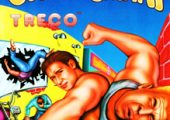
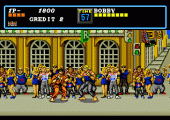
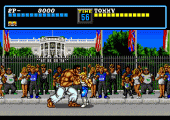
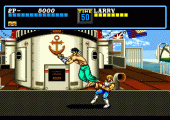
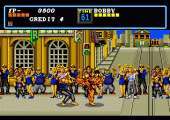
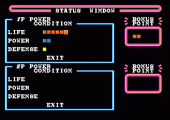
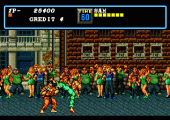
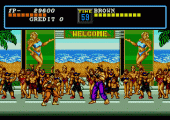
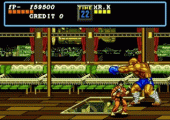
I totally agree with this review. This game has not much to offer and it was a bad idea from the start to adapt it, as the SNK version is no winner either. The biggest issue here is the gameplay, the hit detection is so bad that you never know when you’ll hit your opponent or when he’ll hit you. It’s all a matter of luck/bad luck, which is never good for a brawler now is it.